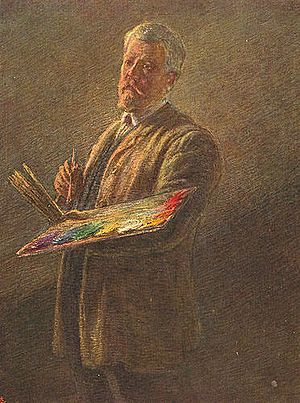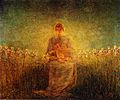Gaetano Previati facts for kids
Quick facts for kids
Gaetano Previati
|
|
|---|---|

Self-portrait (1911)
|
|
| Born | 31 August 1852 |
| Died | 21 June 1920 (aged 67) Lavagna, Kingdom of Italy
|
| Nationality | Italian |
| Education | Brera Academy in Milan |
| Known for | Painting |
| Movement | Divisionism, Symbolism |
| Patron(s) | Vittore Grubicy de Dragon |
Gaetano Previati (1852–1920) was an Italian painter. He was known for his unique style called Symbolism. He also used a painting technique called Divisionism.
Contents
Gaetano Previati's Early Life and Art
Gaetano Previati was born in Ferrara, Italy. In 1876, he moved to Milan. There, he studied art at the Brera Academy of Fine Arts. His teachers included famous artists like Giuseppe Bertini. Previati loved to paint historical and religious scenes. He often added a touch of mystery and strong feelings to his artworks.
He became very interested in Divisionism. This was a painting style where artists used small dots or lines of pure color. They placed these colors next to each other to create a vibrant effect. Previati even wrote a book about it in 1909. It was called I principi scientifici del Divisionismo, which means The Scientific Principles of Divisionism.
Winning Awards and New Connections
In 1879, Previati won the Canonica prize for his painting Gli ostaggi di Crema. The next year, he showed a large painting called Cesare Borgia at Capua in Turin. By 1881, he had settled in Milan for good. Here, he met artists from the Scapigliatura movement. This group of artists and writers wanted to break away from old traditions.
Previati showed many paintings in 1881. These included Preferenza, Christ Crucified, Abelard, and At the entrance of the Harem. In 1883, he displayed Un angolo del solaio, May, and Saleswoman. He also showed Angels and A November at Ferrara in Rome.
Patriotic Art and Challenges
In 1886–87, Previati exhibited a patriotic painting called Tiremm innanz. This title means "Fire away" in a local dialect. The painting showed the execution of Antonio Sciesa. Sciesa was a patriot who fought against Austrian rule in Milan. This artwork caused some controversy with the government. For example, an award for his painting Cleopatra was later taken away by the art council in Milan.
Later Career and Artistic Style
Previati took part in the first Brera Triennale art show in 1891. His work clearly showed his new Divisionist style. He also started using Symbolist themes. Symbolism in art focuses on ideas and emotions rather than just showing reality.
He was invited to show his art at the Venice Biennale many times. This is a very important art exhibition. He participated from 1895 to 1914. He even had his own special shows there in 1901 and 1912. In 1907, he helped create the Dream Room at the 7th Biennale.
Exhibitions and Support
Previati also showed his art in Paris. This was at an exhibition called the Salon des Peintres Divisionnistes Italiens. It was organized by an art dealer named Alberto Grubicy. Alberto and his brother Vittore were big supporters of Previati's art. In 1911, they even started a group called the Società per l’Arte di Gaetano Previati. They bought many of his paintings and showed them in exhibitions in Genoa (1915) and Milan (1916 and 1919).
Gaetano Previati passed away in 1920 in Lavagna, Italy. He often spent long periods of time there.
Gallery
See also
 In Spanish: Gaetano Previati para niños
In Spanish: Gaetano Previati para niños
 | William Lucy |
 | Charles Hayes |
 | Cleveland Robinson |





